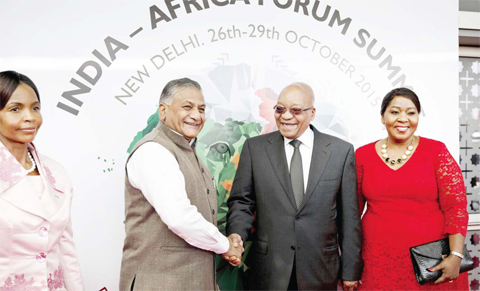 South African President Jacob Zuma, second right, is received by India’s junior minister for external affairs V. K. Singh as he arrives for the India Africa Forum Summit, at the Indira Gandhi International airport in New Delhi, India
South African President Jacob Zuma, second right, is received by India’s junior minister for external affairs V. K. Singh as he arrives for the India Africa Forum Summit, at the Indira Gandhi International airport in New Delhi, India
NEW DELHI: In Mozambique, India is building a solar panel plant that will help the southern African country harness renewable energy. Cameroon, in Central Africa, has sought India's help in fighting the Islamic extremist group Boko Haram. In Ethiopia, Indian technical and financial aid has helped transform the country into a major sugar producer, creating tens of thousands of jobs.
More than 40 African leaders are in New Delhi for a summit to explore how Indian investment and technology can help a resurgent Africa face its development challenges. The summit, which starts today, was preceded by meetings of trade and foreign ministers from nearly all 54 African nations.
"It gives you an idea of the significance India has attached to its engagement with Africa," said Ruchita Beri, an Africa specialist at New Delhi's Institute for Defense Studies and Analyses. In exchange, India hopes for a share of Africa's vast natural resources to power its own growth, as well as the support of African states to boost its profile as a global power. It also wants to ensure it is not completely overshadowed on the continent by its neighbor and rival, China.
Over the past decade, China has plowed billions of dollars into Africa, building roads, bridges and power installations in return for access to markets and resources.
"The Chinese presence in Africa is increasing day by day, and I don't think we can compare India's involvement in Africa with that of China," Beri said.
"It's not just China. Others are there as well in the scramble for resources. Japan, the United States, and several emerging markets, such as Malaysia, Brazil, Turkey, are all looking at Africa in their quest for resources," she said.
India's major imports from Africa are resources and minerals, including crude oil, coal, gemstones and gold. African countries are a big market for Indian-made pharmaceuticals, motor vehicles and processed petroleum products, with trade growing at a fast clip.
Trade doubles
Indian officials say trade has grown 20 times since 2000, and doubled in the last five years to reach nearly $72 billion in 2014.
India and many African countries "are the most rapidly growing developing economies in the world," said External Affairs Minister Sushma Swaraj. India's relations with Africa are not just centered on business, officials emphasize. New Delhi has also provided millions of dollars in educational and humanitarian aid.
In the last five years, 25,000 African students have received scholarships to study in India. A major chunk of India's development aid has been spent on setting up technical institutes, educational facilities, hospitals and training programs across Africa.
Indian credit has topped $7.4 billion and has led to the creation of about 137 projects in 41 countries, ministry official Navtej Sarna said.
"Don't forget, we have been partners with Africa in capacity building since early days," Sarna said. "We were there as the earliest peacekeepers. We were there with the major struggles that Africa had against colonialism and discrimination and apartheid."
Defence sector
The long-standing ties were reflected in bilateral meetings with Swaraj on Tuesday and Wednesday when African leaders presented their wish-lists. Several, including Cameroon, Nigeria, Niger, Chad and Benin, sought Indian assistance in dealing with Islamic extremism.
"They wanted India to help them in capacity building in the defense sector so that the combined forces that are right now combating Boko Haram can be strengthened," said Sanjiv Kohli, another official who attended many of the meetings.
India has promised to help train soldiers in counterterrorism and counterinsurgency tactics, Kohli said. South Sudan wanted Indian help in cattle farming and livestock management. India, the world's largest milk producer, said it would send dairy experts.
In Mozambique, the Indian-built solar panel plant will not just help the country scale up its use of environmentally friendly solar energy, but is expected to lead to exports of solar panels to neighboring countries.
Publicly, India insists its engagement with Africa has nothing to do with China. But New Delhi is clearly concerned about Beijing's increasing clout in the continent. Indian concern about China's growing maritime footprint in the Indian Ocean - a key waterway for access to energy supplies from the Gulf and Africa - has increased with recent reports that Beijing is planning to set up its first overseas military base on the tiny African nation of Djibouti, strategically located at the mouth of the Gulf of Aden.
Indian experts also are quick to say that all is not well with China's Africa strategy. They say the use of Chinese labor in infrastructure projects in Africa has not been well received by many host countries, which desperately want jobs for their own people. Also, Chinese workers' wages are often paid directly into bank accounts back home, so local banks earn nothing from transactions. - AP




